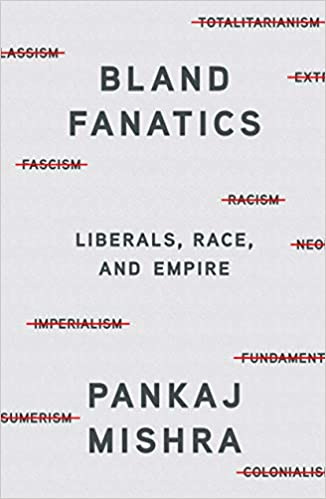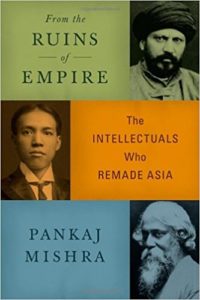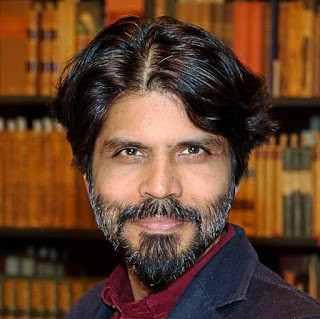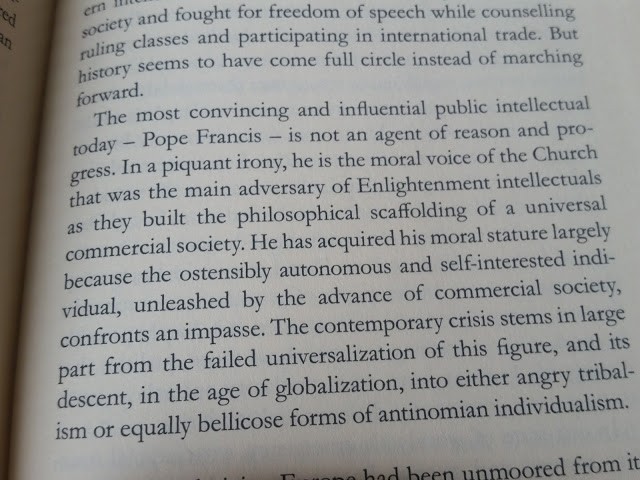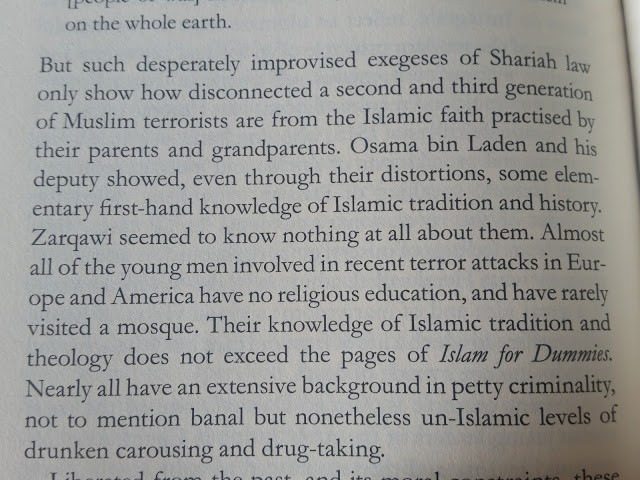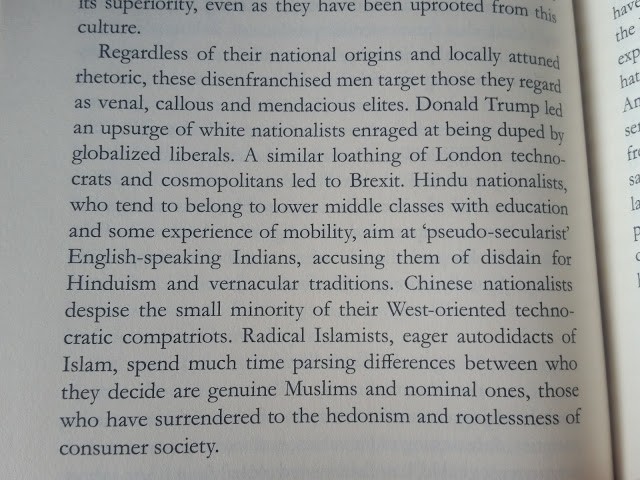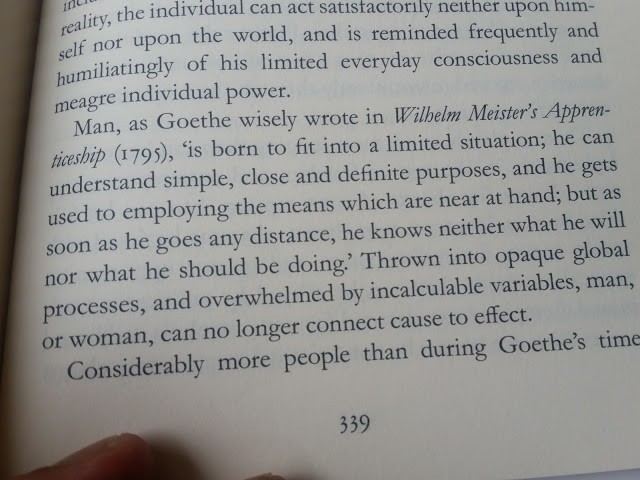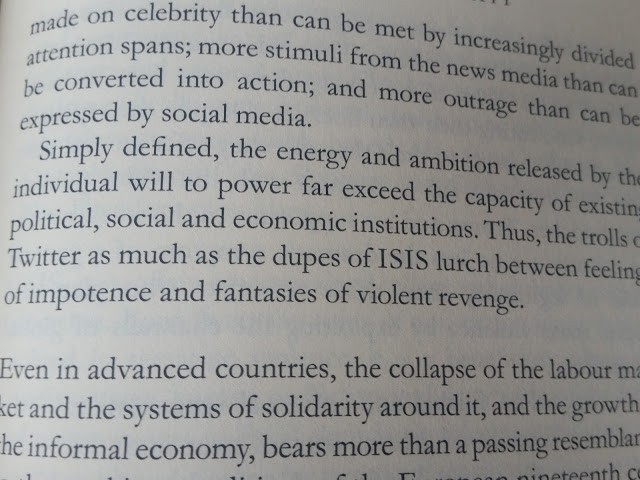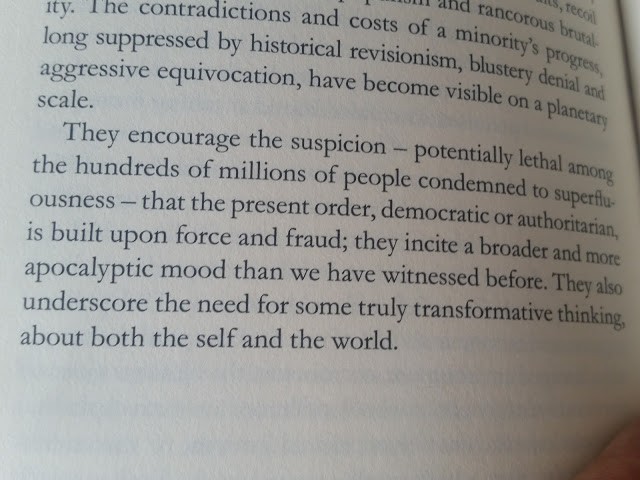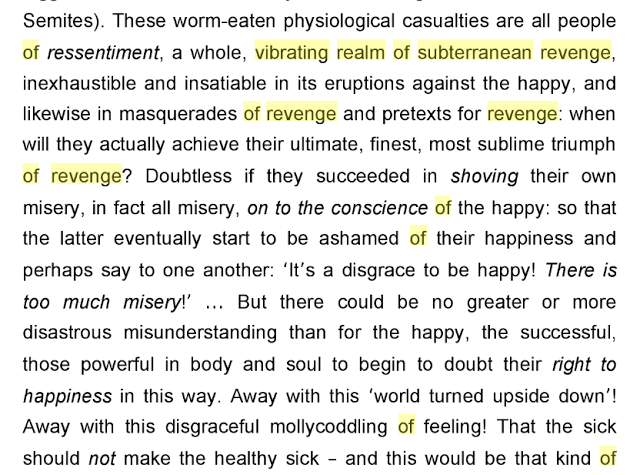Postscript: Having been told this is a rant, not a review, I have decided to add this disclaimer: it IS a rant. And no, it is not personal. I have never met Pankaj and for all I know he is probably a very nice guy. This is not so much about him as about the postliberal Eurocentric elite in general. That he writes this for them and they love him for it makes me use him as a focus for my criticism. Someday, if i have the discipline and/or the time, I should write a long-form essay and not make it about him but about the worldview in general. Until then, he gets to stand in for the lot of them. But it is NOT personal.
Pankaj Mishra is a British-Indian writer and public intellectual who currently lives between London and Mashobra and writes regularly for publications like the NY Times and the NYRB. He started his career as a promising literary critic (Naipaul was initially impressed) but soon switched to “native informant” mode, presenting and interpreting what he described as the angst, atomization, envy and ressentiment of newly emerging and fitfully modernizing India; a phenomenon that other elite commentators and foreign visitors were presumably failing to notice. He then expanded this theme to all of Asia and has finally graduated to interpreting the Metropole to the metropolitans themselves. This could have been a somewhat risky move, since Western reviewers who received his reports about the darker nations relatively uncritically, might well know enough about their home turf to become critical. But by and large, that has not happened; reviews have generally been favorable.
This is not one of those favorable reviews.
I found the book tendentious, shallow and repetitive, with quotes and facts cherry-picked from across his vast (but chronologically limited and highly Eurocentric) reading list, full of unfounded assumptions and opinions that are casually passed off with an “as everyone knows” air in practically every paragraph.
The book begins with a brief account of D’Annunzio’s occupation of Fiume in 1919. This relatively obscure episode is sprinkled with cherry-picked quotes and while the facts are mostly true, their significance is asserted rather than proven. This pattern is followed throughout the book; vast historical claims (e.g. that modernity led ultimately, not just transiently, to more immiseration in Europe; “First manifested in 19th century Europe – Bursts of technological innovation and growth offset by systemic exploitation and widespread immiseration“) are casually asserted as if they are already known and accepted by all sane-thinking people. There is no systematic description of what happened economically, socially or culturally in Europe (or elsewhere) in the last 200 years, and no data is ever offered to support any claims, but since these claims (sometimes stated, frequently just hinted at) are almost all prevalent (if only vaguely and without systematic evidence) in postmodern liberal European (and Westernized Desi) circles, so the book gets a pass in those circles; but the fact is that if you stop and dig into any random claim, the tone and the details will not pass muster.
It could be objected that this is not the point of the book. As Pankaj himself puts it:
“This books is not offered as an intellectual history; and it cannot even pose, given its brevity, as a single narrative of the orign and diffusion of ideas and ideologies that assimilates teh many cultural and political developments of the previous two centuries. Rather, it explores a particular climate of ideas, a structure of feeling, and cognitive disposition, from teh age of Rousseau to our own age of anger”
He goes on to say “It tries to show how an ethic of individual and collective empowerment spread itself over the world, as much through resentful imitation as coercion, causing severe dislocations, social maladjustment and political upheaval. ”
Marx said it better but this is not bad either. But unlike Marx, who offered a diagnosis and then a prescription (right or wrong), Pankaj goes on to dig through 200 years of (mostly European) intellectual history to find quotes and episodes that bewail this process of destruction of the old in action; but he never offers a diagnosis of why human beings and human societies created modernity in the first place (after all, even Europeans, or rather Anglo-Americans, who appear in this book as the only people who actually do things instead of just reacting to things being done to them, are also humans); nor does he offer any ideas about what an alternative may look like. What he does add to the diagnosis of some of the authors he quotes is a relentless focus on ressentiment as the quintessential human emotion; the secret sauce that explains everything that Pankaj does not like about the world today, from Trump and Modi to Erdogan and, somewhat surprisingly, the New York Review of Books (“a major intellectual periodical of Anglo-America“).
Resentment and envy drive everything in Pankaj-world. Herder and Fichte, for example, are “young provincials in Germany.. who simmered with resentment against a metropolitan civilization of slick movers and shakers that seemed to deny them a rooted and authentic existence”. This motif is repeated with variations throughout the book. Everyone (except the Anglo-Americans of course) is endlessly burning with resentment and hates who they are. It almost makes one wonder if the book is really about Pankaj digging through 200 years of intellectual history to find his own mirror image everywhere? But this would be to psychologize, and one should try to avoid that, even if Pankaj never does.

Perhaps all this would be fine if he was suitably humble about his own limitations, but of course, he is no such thing. There is a consistent tone of “I have discovered what all of you fools missed” throughout the book. That tone is grating, partly because what he has discovered is not very original, and partly because it is by no means certain that his assessment of the Enlightenment and its major thinkers is the correct assessment. I think it likely that the specialist who specializes in any thinker cited in this book will disagree with the flippant generalizations and cherry-picked quotes, but given that this treatment is being meted out to dozens of thinkers from across the globe and the specialist knows only his own, he may not realize that Pankaj is equally shallow about all of them. For example, he sums up Montesquieu, Adam Smith, Voltaire and Kant in one go with the dismissive “the universal commercial society of self-interested rational individuals that was originally advocated by such Enlightenment thinkers as Montesquieu, Adam Smith, Voltaire and Kant”; is this really a fair and reasonable summary of all that those subtle and profound thinkers wrote and thought? I think it is certainly part of what they said, but Pankaj has no use for their other insights. What he needs for his purposes is the code words “commercial, self-interested, rational”. He knows these will do their magic within his (superficially anti-capitalist) audience, and he is probably right.
Of course, doubts and misgivings about modernity have been the subject of countless works ever since the terms were invented. In fact, the reason Rousseau, Nietzsche and company are one of the two groups who dominate the quote-mining in this book (terrorists and anarchists are the other) is precisely because they did produce works that questioned and critiqued many Enlightenment assumptions. Pankaj, with his focus on resentment and envy is, if anything, a much more limited and shallow version of their work. This may sound harsh, but this book is really little more than a disorganized dictionary of selected (sometimes misleadingly so) quotations and sweeping generalizations about writers who generally thought deeper and harder than Pankaj does. So my suggestion, dear reader, is, why not read them?
Which brings us to another problem with this book; its complete lack of interest in all human history before 1688 and in all civilizations except the European civilization of the last 200 years. Again, one may say that they are not the subject of the book, but the problem goes deeper than that. Not only are they not the subject of the book, it seems that they are not of interest to Pankaj at all. He never shows any interest (or awareness) of humans as biological beings, evolved over millennia, with instincts, drives and abilities shaped by that evolution far more than they can ever be shaped by “modernity”, whatever that may be. He is not interested in 10,000 years of human cultural evolution or in the vast literature on the evolution of political order. And he seems to regard all non-European (or perhaps non-Anglo-American) civilizations as interchangeable place holders for “tradition”, trammeled under the boot of modernity. That China and the Chinese, for example, may not be exact counterparts of his native India, and may even be a civilization that regards itself (justifiably) as a world-leader, a source of many “modern” ideas, fully capable (and desirous) of joining the modern world on its own terms. But these are not notions to be found in Pankaj-land. To him, all non-Europeans are simply interchangeable primitives; “traditional” people driven by resentment and envy and, more to the point, doomed to fakery, imitation and disappointment.
Finally, there is the issue of conscious (or unconscious?) manipulation of facts and anecdotes to fit his agenda. Pankaj seems to know the prejudices and vague preconceptions of his postmodern Eurocentric audience, and he never misses a chance to push their buttons, even if it requires some subtle alteration of events. A few random quotes will illustrate this tendency:
“Turkeys Erdogan to India’s Modi, France’s Le Pen and America’s Donald Trump, have tapped into the simmering reserviors of cynicism, boredom and discontent”. Discontent, yes, but cynicism and boredom? Other than sounding good to his audience, how much sense does this really make?
Speaking of the 1990s “The Dalai Lama appeared in Apple’s “Think different” advertisements and it seemed only a matter of time before Tibet, too, would be free”. Did it? really? to whom? The only reason this sentence appealed to him is because it presses the right buttons. The Dalai Lama, check. Evil corporation Apple, check. Advertisement, check. Sheeple being fooled yet again, check. It is a theme, and it recurs.
He casually claims that the first televised beheading occurred “in 2004, (just as broadband began to arrive in middle-class homes) in Iraq, of a Western hostage dressed in an orange Guantanomo jumpsuit“. This is another classic example of Pankaj in action. It is hard to believe that he has not heard (or did not learn while Googling) that the televised beheading of journalist Daniel Pearl happened two years earlier in 2002; but that beheading was in Pakistan, involved Jew-hatred and did not include an orange Guantanomo jumpsuit. So it doesnt really evoke instant anti-imperialist memes in the way the Iraq invasion and Guantanomo jumpsuits do, so the example chosen has to be Iraq in 2004. And the “broadband arriving in middle class homes” is the cherry on the subliminal messaging cake. This is a minor point, but it is worth noting that even in the case of minor points, the rhetorical needs of Pankaj’s overall project are going to be paramount. The reader has to be on his guard.
“only on the rarest occasions in recent decades has it been acknowledged that the history of modernization is largely one of carnage and bedlam rather than peaceful convergence” . First of all, it is by no means certain that this history is “largely one of carnage and bedlam”, but among those who think this is true, this has been the fashionable view for decades. Pankaj does not get to announce this as new news to the in-crowd.
“Wrought by the West’s transition to industrial capitalism and mass politics..“. We know he is against capitalism. Perhaps against industry as well. But is he also against mass politics? Pankaj will not say “the people” are ignorant, easily manipulated fools, but he is never too far from implying exactly that. It would be hugely interesting if he went deeper into this topic and reached some philosophically interesting (and perhaps even controversial) conclusions (aristocratic ones? under that “man of the people from Jhansi” exterior?) but this is another reason I am not a fan of his books. You get the party line, and nothing but the party line. The message is in fact NEVER controversial or new or shocking. it is exactly tailored to fit current postliberal fashions and where those fashions are internally contradictory, Pankaj will not venture. Sad!
By the way, he thinks Pope Francis is the “most convincing and influential public intellectual today”. Convincing? to whom? and MOST influential??
When it comes to Islam, he is even more predictable and safe. The following, for example, is a fairly typical example of clueless Euroliberal apologetics, and Pankaj may even know better, but he knows what buttons to push, so here it is.
(Osama and Zarqawi, not to speak of Al-Baghdadi, who has a PhD in Islamic studies, do in fact know a lot about the Islam of their ancestors. that the foot soldiers don’t know the theological details is neither here nor there; foot soldiers of other ideologies don’t know either)
He is not always wrong. In fact he is frequently perfectly correct, but in a trite and almost trivial way. For example, he says (correctly in my view) that “those routinely evoking a woldwide clash of civilizations in which Islam is pitted against the West, and religion against reason, are not able to explain many political, social and environmental ills”. Yes, but to hear him say it, you would think everyone except Pankaj thinks this is the case. But in fact, hardly any liberal commentators see this as the main explanatory framework for the world today. Debunking this to a liberal audience (and there is no other audience for this book) seems like the easiest of easy shots, not worth wasting 350 pages. But that is the problem with the book: in the end, it is just dumbed down propaganda, preaching to the converted, telling then what they already believed, but making them feel like they are participating in the unmasking of some deep and meaningful secret. This formula surely works as a way to sell books and get good reviews. But for anyone interested in new information or deeper insights, it is a waste of time. What Scruton said about Foucault’s “The order of things” (“an artful book.. a work not of philosophy but of rhetoric”) applies to this book too. Which is unfortunate. Pankaj is obviously intelligent and very widely read. He could do something more interesting than just artfully massaging the fashionable prejudices of his class and his audience.
Besides, while he hates this “soul-killing world of mediocrity and cowardice” he is also a Westernized liberal (or post-liberal) who cannot possibly stand alongside, say, the extreme Hindu or Islamic radical who says exactly the same things. To him, those people are justified in their rebellion (though he is not at all sympathetic to the Hindu variety, relatively gentle on the Islamist variety, and most forgiving of the Leftist variety, because of the particular politics of his own peer group) but at the same time he cannot really advocate any “return to traditional mores” because of course, those mores are patriarchal, heirarchical, transphobic etc etc.. Knowing this and knowing his audience, he never goes too far into this problem. But the problem is very real. If modernity is evil, then why not the premodern? And if that too is “problematic”, then we have a bigger human issue on our hands and all this handwaving has done nothing to bring us one step closer to a solution.
PS: a couple of other random screenshots
“Man..can no longer connect cause to effect”. OK, but that implies a return to very ancient isolation. Is that the solution? maybe it is, but you won’t hear more about it from Pankaj. He presses the button, makes you feel deep, and moves on.
The book is full of this sort of elevated pseudo-discourse..
We end where we began. We need to do something new. But what?
by the way, since Pankaj quotes Nietzsche on ressentiment, here is the original. Judge for yourself..
